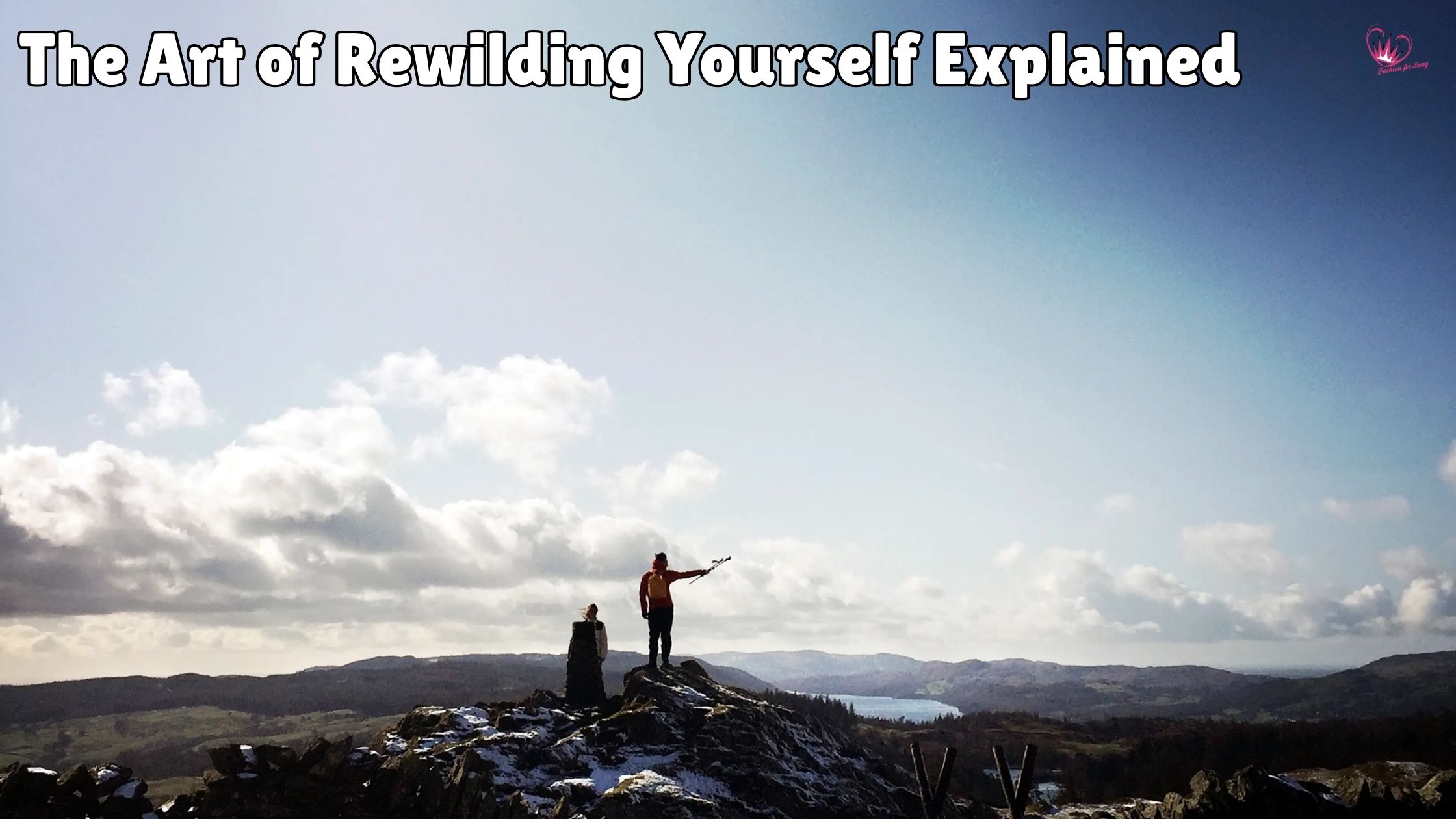
The Art of Rewilding Yourself Explained
Tireless programs, digital dependence, and concrete forests, many of us feel a deep disconnect from nature, our body, and our most authentic self. We live a life set by watches and screen, and as a result, a part of our innate human essence has been “unpublished”. Re -enter yourself: A personal journey to join with our fundamental nature, restore our congenital rhythm, and find a sense of peace and vitality that the modern world often disappears.
While the term “revolution” is traditionally used to describe the mass restoration of the ecosystem in ecology, in their natural, self -sufficient condition, the concept has been beautifully optimized for personal development. It is not about the society to leave to live in the forest, but rather consciously about integrating the principles of the wild – the relationship, appearance, and a deep connection to the natural world – back to your daily life, no matter what you live.
The Psychology of Disconnection: Why We Need to Rewild
Our modern world, for all its amenities, has created a significant difference between us and the natural environment. This separation has a tangible psychological and physical effect.
- Sensory absence: In our urban environment, our senses often become dull. We are bombing with artificial light, continuous noise and processed foods. The subtle voice of birdsong, the smell of the earth after the rain, or the rough bark under our hands is luxury, not a daily reality. This deficiency of sensory engagement may lead to a feeling of “switch off” or separation.
- Stress and “tamed” life: Our life is governed by the continuous state of low-level stress. An endless stream of work deadlines, traffic jams, and digital information keeps our nervous system on high alert. This chronic stress can be mentally and physically dry. Rewilding provides an antidot by encouraging cortisol -reducing activities and activates the parasympathetic nervous system, promoting comfort and treatment.
- Loss of congenital rhythm: The life of our ancestors was directed by the chakras of the natural world – the rising and settings of the sun, changing the seasons, the flow of the eb and the tide. Today, we override these rhythms with artificial light and round-the-clock schedule. This disruption can throw our circadian rhythm out of balance, causing poor sleep, fatigue and other health issues.
Creating yourself again, at its core, is a deliberate rebellion against this disconnection. It is a commitment to recover its internal balance and tap in powerful, restructural qualities of the natural world.
The Core Pillars of Rewilding Yourself
The practice of rewinding is not a size-fit-all solution; This is an individual journey to suit your unique circumstances. However, it can be directed by some main principles.
1. Reconnect with Nature: The Foundation
This is the most obvious and important component. It is a conscious manner about establishing nature in your life, even small, simple methods.
- Sensory immersion: Attach all your senses. When you are in a park, just don’t walk through it; Stop and feel the sun on your skin, listen to the rustle leaves, smell the soil odor, and touch the plants.
- Look for “wild”: This does not mean that you have to travel to a national park. This can be a local wood area, a community garden, or even a calm in a park where you can observe wildlife. The goal is to find a location with minimal human intervention.
- Grounding (Earthing): This exercise involves making direct contact with the Earth’s surface. Walking barefoot on grass, soil or sand for a few minutes can help reduce inflammation and improve mood.
- Bring nature indoors: Fill your home with plants, open your windows to go to fresh air and natural light, or use natural materials in your decoration. These small changes can have a major impact on your feeling of goodness.
2. Disconnect from Technology: The Digital Detox
Our equipment are powerful tools, but they also create a continuous source of distraction and stress. A significant part of revolution is installing boundaries with technology.
- Nominated “unplug” time: When you put your phone, tablet and computer, keep the specific time of the day or week separate. Use this time to read a book, journal, or simply sit in silence.
- Tech-free zone: Make a tech-free zone in your home, such as dining table or bedroom. This helps you to be more present during meals and improves your sleep quality.
Embrace, allowing yourself to get bored is encouraged to wander your mind and re -connect with your thoughts and creativity.
3. Move and Nourish Your Body Naturally
Our body is designed for movement and real, whole foods. Rewinding involves respecting these congenital needs.
- Primal Movement: Include movements that attach your body to natural, functional methods. It can pull and move your body without hiking, climbing trees, swimming in a lake, or simply a gym boundary.
- Mindful Eating: Note where your food comes from. Opt for local, seasonal yield. Learn Forest for safe, food plants. The task of collecting and preparing food from the natural world is a deep satisfactory and grounding experience.
- Listen to your body: Our bodies are incredibly comfortable. Learn to listen to the signs of your hunger, your need to relax, and your desire to move. Honoring these signs is an important part of the reunion process.
4. Cultivate Your Inner Wildness: Psychological Rewilding
This is probably the deepest aspect of the journey. It is about psychological and emotional liberation.
- Embrace your original senses: Our ancestors trusted their senses to survive. Faster your senses by practicing an arbitrary observation. Close your eyes and identify your surrounding sounds. See how many different shades of green you can see on the same tree. This practice brings you to the present moment and re -connects you with your surroundings.
- Connect again with the game: As adults, we often lose our game spirit. It is necessary to find activities that are purely for pleasure – without prohibition, spatting in the puddle, or innate, attached to unnecessary fun.
- Hug of imperfection: Wild dirty, unexpected and incomplete. Re -preparing yourself means to leave the need for continuous control and perfection. It is about accepting the chaos and beauty of life as it is.
- Jernling and self-discipline: Write “love letter to your wild self”. Reflect your parts that are suppressed by social expectations. Do you feel really free? Do you get a feeling of amazement?
The Profound Benefits of Rewilding Yourself
The awards of this journey are far -reaching and deeply influential.
- Mental health promotion: Studies have consistently shown that time in nature reduces symptoms of stress, anxiety and depression. Re -practices can lead to better mood, cognitive work and more understanding of goodness.
- Physical welfare: To improve your body from better sleep and low inflammation to improve physical fitness, rebuilding your body has a direct positive effect on your health.
- Increased creativity and problem-solution: When we stop our brain with constant digital stimulation, we make place for new ideas and solutions.
- Deep understanding of objective: By re -involving the natural world, we often develop more praise for the planet and to protect it. This can be a new sense of purpose and a more durable way of life.
- Authentic connections: Refuying yourself encourages you to add more authenticly with others. When you are more current and grounded, your relationship becomes more meaningful.
Rewilding is not just a trend; it’s a timeless practice that addresses a fundamental human need. It’s about remembering who we are and where we came from. By consciously stepping away from the “tamed” life and re-engaging with our wild nature, we can find a deeper, more resilient, and more joyful way of being. The journey begins with one small step—a walk outside, a moment of silence, a conscious breath of fresh air. It’s time to let your wild self roam free.



